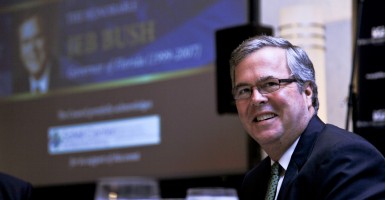In the weeks since announcing he would explore a presidential run, Jeb Bush has emerged as the early frontrunner for Republicans in 2016. But there’s one thing he has been unable to escape: criticism for his support of Common Core education standards.
Columnist George Will is the latest to join a chorus of critics, penning an op-ed that berates Bush’s “impatience” in attempting to understand the opposition to Common Core.
Will cites Bush’s comments that “standards are different than curriculum” and his claim that he would “break out in a rash” if curriculum was influenced by the federal government. But, Will contends, “standards will shape what is tested, and textbooks will be ‘aligned’ with the tests.”
Thus, according to Will, standards do influence curriculum.
“It is not about the content of the standards, which would be objectionable even if written by Aristotle and refined by Shakespeare,” Will writes. “Rather, the point is that, unless stopped now, the federal government will not stop short of finding in Common Core a pretext for becoming a national school board.”
Similar backlash has been pervasive since Bush’s campaign announcement in early December.
>>> Jeb Bush’s Common Core Problem
Politico’s senior education reporter Stephanie Simon called Bush’s support for Common Core his “most glaring education policy weakness” while likely 2016 candidate Sen. Rand Paul, R-Ky., rebuked Bush’s position on Fox News’ “The Kelly File.”
“For Jeb Bush to run in the primary will be very, very difficult because if you’re going to be for a national curriculum and for Common Core and for No Child Left Behind, this accumulation of power in Washington, that’s not very popular,” Paul said in the interview.
Despite the criticism, Bush has repeatedly defended his support for Common Core.
“In my view, the rigor of the Common Core state standards must be the new minimum in classrooms,” Bush said at a December education summit in Washington. “For those states choosing a path other than Common Core, I say this: Aim even higher, be bolder, raise standards and ask more of our students and the system.”
Last week, in a move that could foreshadow an official run, Bush resigned from his education foundation and is no longer a paid adviser for Academic Partnerships, a for-profit company that sells online courses to public universities.
>>> Here’s How People Reacted to Jeb Bush’s 2016 Announcement, in 36 Tweets
Aides told the Washington Post that Bush wants to focus his time on politics, but others speculate the move is strategically driven in an effort to separate himself from his contested views on education.
Will says Bush must listen to critics of Common Core, drawing a connection to the federal government’s use of Title IX, which “stripped colleges and universities of a crucial component of self-government.”
“If Bush does not see the pertinence of this episode to Common Core, which is the thin end of a potentially enormous federal wedge, he should not be put in charge of the executive branch,” Will writes. “And this talented man will not get the consideration he has earned unless he can credit the intelligence and goodwill of critics who might reciprocate, joyfully.”






























